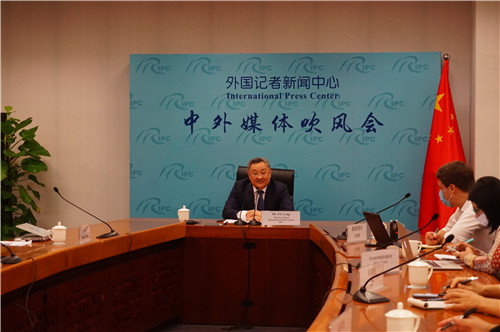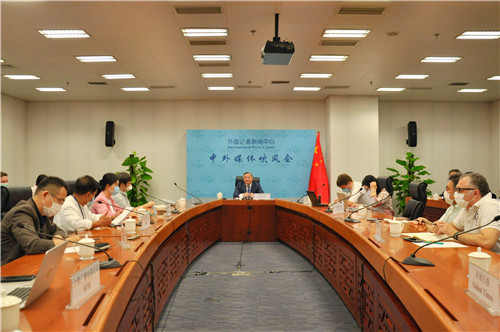
On June 8th, 2020, the Ministry of Foreign Affairs held a press briefing for Chinese and international media outlets. Mr. FU Cong, Director General of the Department of Arms Control and Disarmament, elaborated China's position on current international arms control and disarmament issues, including China's accession to the Arms Trade Treaty, the so-called China-US-Russia trilateral arms control negotiation, and the Compliance Report on arms control agreements issued by the US State Department.
I. On China's accession to the Arms Trade Treaty (ATT)
Mr. FU said, the Standing Committee of the National People's Congress adopted a decision to ratify the treaty on June 20. On the same day, Foreign Minister Wang Yi signed the instrument of accession, thus completing the internal legislative procedure for China's accession to the Treaty. On July 6, the instrument of accession was deposited with the UN Secretary General by the Permanent Representative of China to the United Nations. China's accession to this important arms control treaty is another testimony to China's determination to combat illicit arms trafficking and its commitment to multilateralism and the international arms control regime, and also constitutes another concrete step to implement the grand vision of President Xi to build a community of shared future for all mankind.
Mr. FU pointed out the sharp contrast between the position of China and that of the US on the issue. Mr. FU said, during the UN General Assembly last September, Foreign Minister Wang Yi made the announcement that China would start its internal legal procedure to accede to the Treaty. At the same podium, US President Trump announced that the US would un-sign the same treaty, making it another addition to the long list of international treaties that the US has withdrawn from. This exemplifies the different attitudes of the China and the US towards multilateralism and to international law. It is known to all that ATT was not the end of the list, since then, the US has announced that it would withdraw from the Open Skies Treaty in a few months' time. On the morning of July 8th,2020, people got the news that the US formally notified the UN Secretary General of the decision to withdraw from the WHO.
II. On the so-called trilateral arms control negotiation among US, Russia and China
Mr. FU said, US officials have recently been making a lot of noises about China joining the US-Russia negotiation on nuclear arms reduction. They even went so far as to tweeting a staged photo. China has made its position known on numerous occasions.
Mr. FU reiterated that China has no interest in joining Russia and the US in their bilateral negotiations. Given the huge gap between the nuclear arsenal of China and those of the US and Russia, it is unrealistic to expect China to join the two countries in a negotiation aimed at nuclear arms reduction. China urge the US to respond positively to the call of the Russian Federation to extend the New START Treaty, and on that basis further reduce its huge nuclear arsenal, so as to create conditions for other Nuclear-Weapon States to participate in the nuclear disarmament negotiation. According to the statistics from renowned international think tanks such as the Federation of American Scientists and SIPRI, the US nuclear arsenal stands at about 5800 nuclear warheads, which is almost 20 times that of China's number of nuclear warheads.
The US knows full well the huge gap between the Chinese and American nuclear arsenals, both in terms of quantity and sophistication. And they are bent on increasing this huge gap by investing about USD 494 billion in next 10 years and USD 1.2 trillion in next 30 years to upgrade their nuclear arsenal, both the warheads and their delivery systems. For the US, hyping up the China factor is nothing but a ploy to divert world attention, and to create a pretext, under which they could walk away from the New START, as they have done on so many other arms control treaties. The real purpose is to get rid of all possible restrictions and have a free hand in seeking overwhelming military superiority over any adversary, real or imagined.
Mr. FU emphasized that China's refusal to join the so-called trilateral negotiation does not mean that China is shying away from international nuclear disarmament efforts. On the contrary, China is a strong advocate for nuclear disarmament in the UN and at the Conference on Disarmament in Geneva. China initiated the dialogue on nuclear doctrines among the P5, and proposed that the P5 reiterate jointly the so-called Reagan-Gorbachev formula, i.e. "Nuclear war cannot be won, and must never be fought". Unfortunately, it is the US that has refused to recommit itself to this basic truism. This fact speaks volumes.
Mr. FU made it clear that China stands ready to discuss all issues related to strategic stability and nuclear risk reduction in the framework of P5, i.e. among China, Russia, US,UK and France.

III. On the US Compliance Report on arms control agreements
Mr. FU said, the report paints the US in a perfect light, while making a lot of unsubstantiated allegations about other countries compliance with international arms control agreements and commitments, using very ambiguous language.
Mr. FU highlighted the Biological Weapons Convention (BWC) and the US conduct in relation to that treaty. In 2001, the US was the only country that stood out in opposition to the conclusion of a verification protocol to BWC. And over the past two decades, despite the almost unanimous appeals of the international community, the US has single-handedly blocked the restart of the negotiation of such a protocol. At the same time, more and more questions are being asked about the true nature of the biological activities conducted in some of the US domestic biological laboratories, including those at the Fort Detrick, and the vast number of biological laboratories the US has set up across the world, including in China's neighbourhood. Is the US in full compliance with the BWC? Because of the absence of a verification mechanism due to the US opposition, these questions remain unanswered. China urge the US to demonstrate more transparency and heed the appeals of the international community in not blocking any further the restart of the negotiation of the verification protocol.
Mr FU also answered questions from journalists on issues including the development of China's national defense, nuclear disarmament, intermediate-range missiles, and China's arms trade policy.









